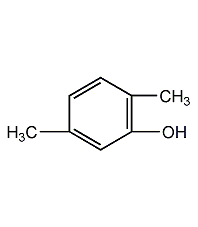
Structural formula
| Business number | 029H |
|---|---|
| Molecular formula | C8H10O |
| Molecular weight | 122 |
| label |
3,4-dimethylphenol, 3,4-xylenol, 3,4-Dimethylphenol, o-4-Xylenol, 1-Hydroxy-3,4-dimethylbenzene, 3,4-Dimethyl-phenol |
Numbering system
CAS number:95-65-8
MDL number:MFCD00002304
EINECS number:202-439-5
RTECS number:ZE6300000
BRN number:1099267
PubChem number:24893534
Physical property data
1. Properties: white crystal.
2. Boiling point (ºC, 101.3kPa): 227
3. Boiling point (ºC, 13.3kPa): 160
4. Boiling point (ºC, 2.67 kPa): 122
5. Melting point (ºC): 65.1
6. Relative density (g/mL, 25/25ºC, solid): 1.138
7. Relative density (g/mL, 80/4ºC): 0.983
8. Flash point (ºC): 110
9. Kinematic viscosity (m2/s, 80ºC): 0.0305×10-4
10. Kinematic viscosity (m2/s, 120ºC): 0.01270×10 -4
11. Kinematic viscosity (m2/s, 160ºC): 0.00737×10-4
12. Heat of evaporation (KJ/mol): 49.70
13. Heat of generation (KJ/mol): 242.54
14. Heat of combustion (KJ/mol) : 4337.82
15. Critical temperature (ºC): 456.7
16. Solubility (%, 25ºC, water): 0.4
17. Solubility: difficult Soluble in water, miscible with ethanol, chloroform, ether, benzene, etc. Soluble in sodium hydroxide aqueous solution.
18. Refractive index at room temperature (n20): 1.5442d
19. Refractive index at room temperature (n 25): 1.520475
20. Relative density (25℃, 4℃): 0.990275
21. The standard heat of combustion (enthalpy) of the crystal phase (kJ·mol-1): -4334.9
22. The standard claim heat (enthalpy) of the crystal phase (kJ·mol -1): -242.3
23. Gas phase standard combustion heat (enthalpy) (kJ·mol-1): -4420.6
24. Gas phase standard claimed heat (enthalpy) (kJ·mol-1): -156.5
25. Gas phase standard entropy (J·mol-1 ·K-1): 391.27
26. Gas phase standard free energy of formation (kJ·mol-1): -34.0
27. Gas phase standard hot melt (J·mol-1·K-1): 163.52
Toxicological data��
1. Acute toxicity: rat oral LD50: 727mg/kg; rat intraperitoneal LD50: 200mg/kg; mouse oral LD50: 400mg/kg; mouse intraperitoneal LD50: 50mg/kg; rabbit Oral LD50: 800mg/kg;
2. Other multiple dose toxicity: Rat oral TDLo: 5075mg/kg/10W-I;
3. Chronic toxicity/carcinogenicity: Mouse skin contact TDLo: 4000mg/kg/20W-I;
4. The steam is irritating to the eyes and respiratory mucosa
Ecological data
BOD5 (five-day biological oxygen demand): 1.5 ThOD: 2.619 This substance is harmful to the environment. Special attention should be paid to the pollution of air, water environment and water sources.
Molecular structure data
1. Molar refractive index: 37.78
2. Molar volume (cm3/mol): 120.4
3. Isotonic specific volume (90.2K ): 297.5
4. Surface tension (dyne/cm): 37.2
5. Polarizability (10-24cm3): 14.97
Compute chemical data
1. Reference value for hydrophobic parameter calculation (XlogP): None
2. Number of hydrogen bond donors: 1
3. Number of hydrogen bond acceptors: 1
4. Number of rotatable chemical bonds: 0
5. Number of tautomers: 9
6. Topological molecule polar surface area 20.2
7. Number of heavy atoms: 9
8. Surface charge: 0
9. Complexity: 90.6
10. Number of isotope atoms: 0
11. Determine the number of atomic stereocenters: 0
12. Uncertain number of atomic stereocenters: 0
13. Determine the number of chemical bond stereocenters: 0
14. Number of uncertain chemical bond stereocenters: 0
15. Number of covalent bond units: 1
Properties and stability
1. Avoid contact with strong oxidants. Corrosive and toxic. Can burn when exposed to open fire.
3. Exist in oriental tobacco leaves and smoke.
3. Highly toxic!
Storage method
Store in a cool, ventilated warehouse. Keep away from fire and heat sources. Protect from direct sunlight. The packaging is sealed. They should be stored separately from oxidants and food chemicals, and avoid mixed storage. Equipped with the appropriate variety and quantity of fire equipment. Suitable materials should be available in the storage area to contain spills.
Synthesis method
1. The crude phenol obtained from the washed oil fraction of coal tar through sodium hydroxide saponification and sulfuric acid acidification contains phenol, cresol and xylenol. Mixed xylenol can be obtained by separation of crude phenol. 3,5-xylenol is removed by distillation, and the remainder is distilled. The 225-229°C fraction is collected, cooled and crystallized, and centrifuged to obtain 3,4-xylenol. . In addition, this product can also be obtained by using o-xylene as raw material through sulfonation, alkali fusion, acid precipitation and distillation.
2. Tobacco: OR, 26.
Purpose
Used in raw dyes, disinfectants, solvents, drugs and as antioxidants. Source of 3,4-xylenol and 3,5-xylenol, and can be used as raw material for disinfectants, plasticizers and pesticides. 3,4-xylenol is used to prepare imine resins (engineering plastics), disinfectants, pesticides, dyes and spices, etc. 3,5-xylenol is used as a disinfectant, insecticide, spice, dye, antioxidant, raw material for synthetic resin, etc.

 微信扫一扫打赏
微信扫一扫打赏

